Biden is already carving out a different Middle East policy from Trump — and even Obama
- Written by Ben Rich, Senior lecturer in International Relations and Security Studies, Curtin University
The Biden administration hasn’t wasted time in making a significant shift in US policy toward the Middle East.
Over the past week, the US has launched reprisal strikes against Iranian targets in Syria and released damning intelligence overtly linking the crown prince of Saudi Arabia to the assassination of journalist Jamal Khashoggi.
Both decisions represent an important departure from the Trump administration, which acted recklessly in its actions toward Iran and enabled the worst impulses of Saudi Arabia’s foreign policy.
Perhaps less obvious, though, are how Biden’s actions differ from those of his former boss, Barack Obama. Biden is already adopting a bolder approach to dealing with troublesome states than Obama was ever willing to.
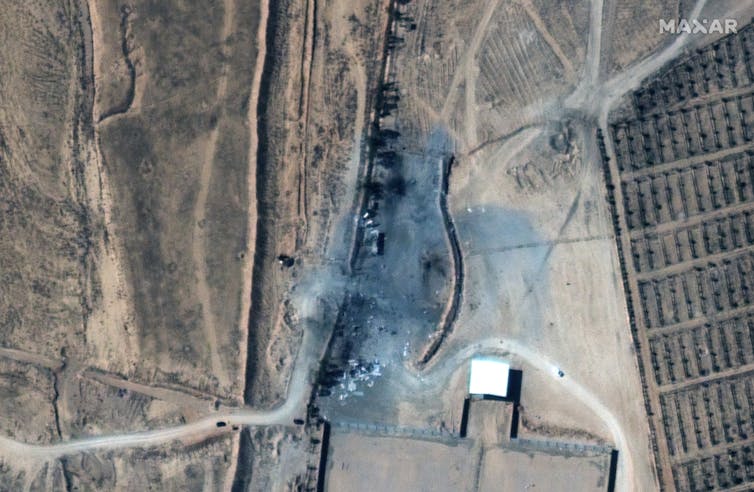 Satellite images show the buildings that were destroyed by a US air strike in Syria last weekend.
Satellite image ©2021 Maxar Technologies/AP
Satellite images show the buildings that were destroyed by a US air strike in Syria last weekend.
Satellite image ©2021 Maxar Technologies/AP
A disciplined approach towards Iran
Biden’s decision to launch strikes against Iran-backed militias in Syria showcases what has been described by the US political scientist Joseph Nye as “smart power”. This is when hard power is employed alongside soft power in a carefully calculated way to affect a diplomatic outcome.
In this case, the US worked collaboratively with the Iraqi government and intelligence officials to develop and execute the planned strikes in Syria.
The strikes themselves, which hit militia logistical and staging targets in Syria, were designed to signal US resolve to stand up to Tehran’s provocations. At the same time, they were calibrated in a way that would de-escalate tensions, avoiding a more direct attack on Iran that could provoke its leadership further.
Washington clearly telegraphed its actions as a direct response to attacks by Iranian-backed militias against US targets in Iraq in mid-February.
Within the context of the wider negotiations around Iran’s nuclear program, Biden is clearly communicating that certain behaviours will not be tolerated and Iran cannot affect the negotiations through destabilising behaviour.
Compared to Trump’s bullying behaviour
Contrast this with a similar action undertaken by the Trump administration in early 2020 — the assassination of Iranian General Qassem Soleimani in Iraq.
Here, the US acted unilaterally and provided no forewarning to Baghdad. It also violated its ally’s sovereignty in a manner that damaged its domestic credibility and stoked Iraqi outrage.
The attack was deliberately provocative, brazenly killing an Iranian national hero in a manner that challenged the domestic legitimacy of the regime in Tehran. This forced a rapid Iranian response that could have easily spiralled out of control if not for pure luck.
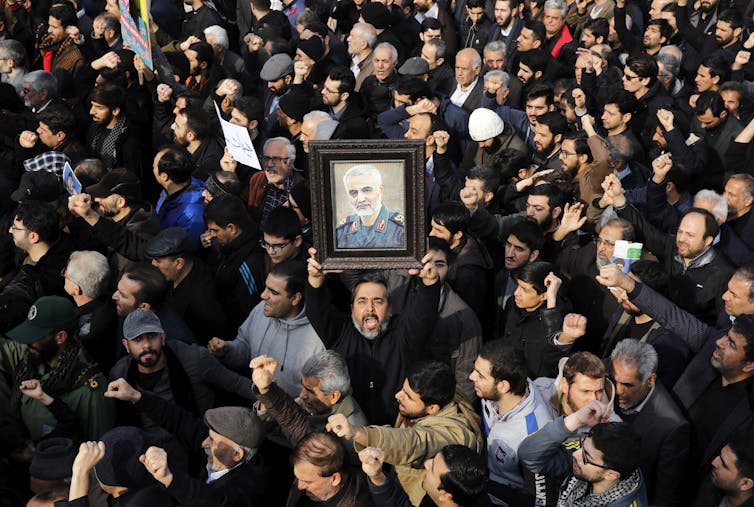 Soleimani’s killing triggered massive protests in both Iran and Iraq.
ABEDIN TAHERKENAREH/EPA
Soleimani’s killing triggered massive protests in both Iran and Iraq.
ABEDIN TAHERKENAREH/EPA
The strike itself also lacked a clear reasoning beyond the Trump administration’s ambiguous campaign of applying “maximum pressure” against Iran. Indeed, Trump officials made several contradictory justifications for the action, none of which were convincing. Combined with Trump’s personal gloating over the killing, this led to a widespread perception of illegality on the part of the United States.
And coming at a time when the Trump administration was trying to push Iran back to the negotiating table over its nuclear program, the strike had little meaningful effect. It only served to undermine US credibility by showcasing Washington as a shortsighted bully.
Put simply, Biden’s recent air strike was a wrap on the knuckles, designed to urge Iran towards a more constructive path of engagement with the US.
By contrast, Trump’s action was a wild slap in the face, designed to hurt and insult, but offering little credible way forward in the US-Iran relationship.
Acting to restrain Saudi Arabia
Biden has also diverged sharply from Trump in his handling so far of Saudi Arabia.
By releasing US intelligence linking Crown Prince Mohammed bin Salman to Khashoggi’s killing, Washington made it clear that its days of running interference for Saudi Araba’s own provocative actions were drawing to a close.
Similarly, Biden has also indicated that while he remains committed to Saudi national defence, he expects the kingdom to wind down its ruinous six-year war in Yemen and embrace a more progressive position on universal human rights.
Biden’s commitment to these ideals, combined with the increasingly anti-Saudi sentiment across the other branches of the US government, suggest the president will have an extensive array of tools to punish the Saudis for their intransigence, should it come to that.
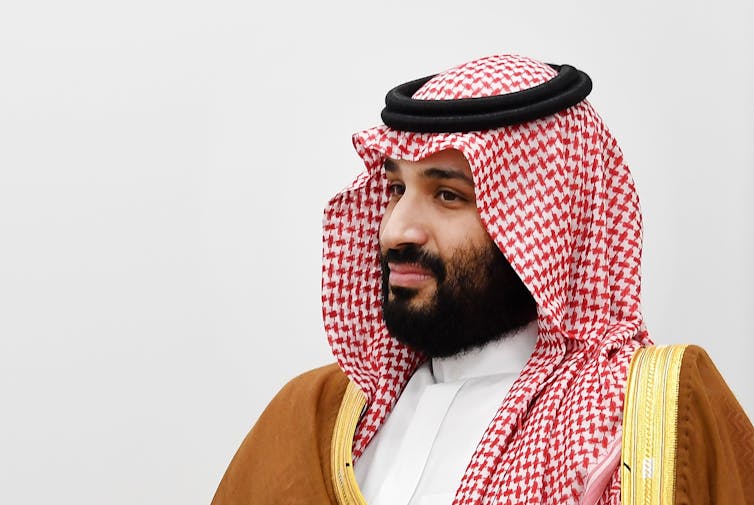 US intelligence reportedly found that Crown Prince Mohammed bin Salman had approved Khashoggi’s murder.
ANDY RAIN/POOL/EPA
US intelligence reportedly found that Crown Prince Mohammed bin Salman had approved Khashoggi’s murder.
ANDY RAIN/POOL/EPA
Obama’s more cautious approach
Biden’s divergences with the Obama administration in its Middle East policy are more subtle, yet just as important.
Generally speaking, Biden is considered to be the spiritual successor to Obama, his former commander-in-chief. But his own style, approach and worldview differ in significant ways.
In the case of Iran, Biden has shown that unlike Obama, he is willing to use force within the wider context of multilateral negotiations, and is less dovish about the threats posed by potential Iranian reprisals.
Indeed, Obama was strongly adverse to employing a “smart power” approach when it came to Tehran, worrying that any use of force would jeopardise diplomatic wrangling around the Iran nuclear agreement.
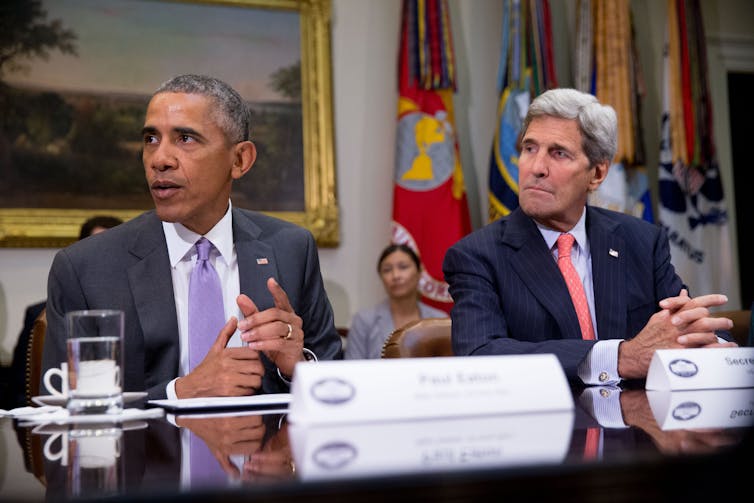 The Obama administration put much of its attention on the Iran nuclear deal, which was agreed to in 2015.
Andrew Harnik/AP
The Obama administration put much of its attention on the Iran nuclear deal, which was agreed to in 2015.
Andrew Harnik/AP
Such reticence was reflected in a number of major policy decisions by Obama in response to the norm-breaking activities of other states. This included his infamous walking back from the “red line” over Syria’s use of chemical weapons against its own people and his lack of response to Russian meddling in the 2016 US election.
This inaction generated a perception of US passivity and risk adversity that emboldened its rivals and undermined the confidence of its allies.
While Obama was willing to rhetorically protest against Saudi provocations and human rights abuses, there was little serious effort on the part of the administration to materially curtail them.
Indeed, Obama oversaw what was at the time the largest-ever US arms sales to the kingdom and supported its war in Yemen, even after numerous high-profile atrocities came to light.
In contrast to Obama’s hypocrisy on Saudi Arabia, Biden appears to be gearing up to walk the talk. Not only is he using the bully pulpit of the presidency to call out bad behaviour, he has enacted specific policies to discourage such activities.
Read more: Arab Spring: when the US needed to step up, it stood back – now, all eyes are on Biden
A difference in styles
The key difference in the characters of the two presidents is boldness.
While deeply thoughtful and reflective, Obama was known at times for timidity and paralysis-by-analysis in foreign affairs. (This was in stark contrast to his decisive actions against terrorist and insurgent groups).
This left his administration with a track record of missed foreign policy opportunities, as he mulled the pros and cons.
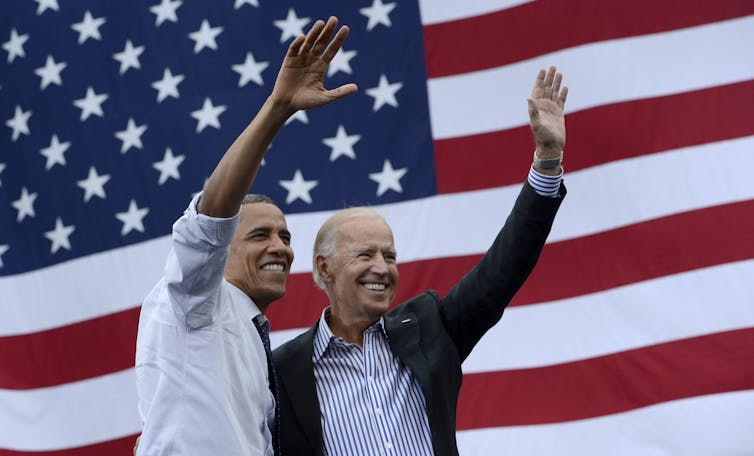 Obama and Biden, allies with very different styles.
Shawn Thew/EPA
Obama and Biden, allies with very different styles.
Shawn Thew/EPA
Biden, by contrast, has a longstanding political history for calculated risk-taking. While he has not always been correct in his decisions, he is willing to back up his words with actions.
Biden fundamentally believes in the liberal international order and is willing to employ smart power to defend and reinforce it where he feels necessary. He will also not likely baulk from the hard realities and choices such an approach will inevitably bring.
This is what both the Saudis and the Iranians are now discovering.
Authors: Ben Rich, Senior lecturer in International Relations and Security Studies, Curtin University





